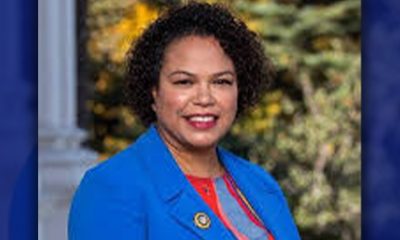Bay Area
S.F. Board of Supervisors OKs Mayor Breed’s Streamlining Legislation to Speed Up New Residential Treatment, Care Beds
The San Francisco Board of Supervisors unanimously approved legislation sponsored by Mayor London N. Breed to make it easier to procure public health beds and provide needed flexibility in obtaining much-needed mental health and/or substance use disorders beds.

By S.F. Mayor’s Office
The San Francisco Board of Supervisors unanimously approved legislation sponsored by Mayor London N. Breed to make it easier to procure public health beds and provide needed flexibility in obtaining much-needed mental health and/or substance use disorders beds.
Approved on Tuesday, the legislation was put forward in partnership with the San Francisco Department of Public Health (SFDPH) and co-sponsored by Supervisors Rafael Mandelman and Hillary Ronen.
Since 2020, San Francisco has been expanding the supply of residential treatment and care beds to meet the need of people with a variety of behavioral health conditions. Under Breed’s expansion plan, the City has added 355 beds, so there is now a total of approximately 2,550 behavioral health treatment and care beds. The City has additional plans to expand this further this year.
These beds come at a critical time for San Francisco as it becomes the first county in California to implement the new state conservatorship laws under Senate Bill 43, which became effective Jan. 1.
While other counties are delaying implementation, Mayor Breed issued an executive directive to begin the process of submitting people for conservatorship under these new laws at the beginning of the year. Along with CARE Court, which became effective last fall, San Francisco has more tools available to help get people into the care they need.
“This streamlining law is exactly the kind of tool we need to deliver services faster for those in need, and I appreciate the Board of Supervisors for quickly approving it so we can get more people help,” Breed said. “When people in our city see people struggling on our street, they want us to move faster and more aggressively to get people into care. Too often we cling to long, bureaucratic processes that stand in the way of solutions, and I’m grateful for support for this common-sense legislation that will expedite our ability to acquire beds and save lives.”
At a time when clients in need of residential care are most vulnerable, and San Francisco is vying for out-of-county beds along with other counties and health systems, the City and County continues to find ways to be more competitive.
The approved ordinance waives the lengthy RFP process required for SFDPH to contract beds for public health use in third-party facilities both in and outside of San Francisco, while still adhering to key transparency and accountability measures.
“With the recent expansion of our conservatorship laws through SB 43, it is critical that we have the treatment placements necessary to meet increased demand,” said Mandelman.
“We are experiencing a severe behavioral health crisis on the streets of our city and this legislation will allow our health professionals to better serve individuals with serious mental illness and substance use disorder immediately,” said Ronen.
“Accelerating the process to obtain these critical treatment beds will better serve our most vulnerable clients,” said Director of Health Dr. Grant Colfax. “Thank you to Mayor Breed and our sponsoring Board of Supervisors for championing this legislation to address our residents’ behavioral health needs and streamline contracting.”
By waiving the lengthy RFP process SFDPH is currently required to undergo when contracting beds for public health use from third-party facilities, the City will be able to:
- Reduce wait times for beds to quickly meet the city’s high demand
- Provide greater diversity of potential providers who may not otherwise respond to RFPs due to bureaucratic hurdles
- Provide flexibility for individual clients with specific placement needs
The approved ordinance is limited in scope and only waives the RFP process for public health beds, including residential care and treatment and isolation and quarantine beds.
“We want to ensure treatment options are available and provide appropriate care as quickly as possible, especially for people with serious mental health or substance use disorders,” said Dr. Hillary Kunins, Director of Behavioral Health Services and Mental Health SF at SFDPH. “Our continued goal is to get more people the treatment they may need and make treatment more accessible, putting them on a path to recovery and wellness.
The approved ordinance waives the RFP process for five years. However, SFDPH will still adhere to City contracting checks and balances, as well as its own internal measures, to ensure that all providers comply with Federal, State and local contract monitoring recruitments.
For more information about San Francisco’s work to expand treatment beds and services, please visit this page or https://londonbreed.medium.com/expanding-treatment-in-san-francisco-e0acfcc980bc
Alameda County
Seth Curry Makes Impressive Debut with the Golden State Warriors
Seth looked comfortable in his new uniform, seamlessly fitting into the Warriors’ offensive and defensive system. He finished the night with an impressive 14 points, becoming one of the team’s top scorers for the game. Seth’s points came in a variety of ways – floaters, spot-up three-pointers, mid-range jumpers, and a handful of aggressive drives that kept the Oklahoma City Thunder defense on its heels.

By Y’Anad Burrell
Tuesday night was anything but ordinary for fans in San Francisco as Seth Curry made his highly anticipated debut as a new member of the Golden State Warriors. Seth didn’t disappoint, delivering a performance that not only showcased his scoring ability but also demonstrated his added value to the team.
At 35, the 12-year NBA veteran on Monday signed a contract to play with the Warriors for the rest of the season.
Seth looked comfortable in his new uniform, seamlessly fitting into the Warriors’ offensive and defensive system. He finished the night with an impressive 14 points, becoming one of the team’s top scorers for the game. Seth’s points came in a variety of ways – floaters, spot-up three-pointers, mid-range jumpers, and a handful of aggressive drives that kept the Oklahoma City Thunder defense on its heels.
One of the most memorable moments of the evening came before Seth even scored his first points. As he checked into the game, the Chase Center erupted into applause, with fans rising to their feet to give the newest Warrior a standing ovation.
The crowd’s reaction was a testament not only to Seth’s reputation as a sharpshooter but also to the excitement he brings to the Warriors. It was clear that fans quickly embraced Seth as one of their own, eager to see what he could bring to the team’s championship aspirations.
Warriors’ superstar Steph Curry – Seth’s brother – did not play due to an injury. One could only imagine what it would be like if the Curry brothers were on the court together. Magic in the making.
Seth’s debut proved to be a turning point for the Warriors. Not only did he contribute on the scoreboard, but he also brought a sense of confidence and composure to the floor.
While their loss last night, OKC 124 – GSW 112, Seth’s impact was a game-changer and there’s more yet to come. Beyond statistics, it was clear that Seth’s presence elevated the team’s performance, giving the Warriors a new force as they look to make a deep playoff run.
Activism
Oakland Post: Week of November 26 – December 2, 2025
The printed Weekly Edition of the Oakland Post: Week of November 26 – December 2, 2025

To enlarge your view of this issue, use the slider, magnifying glass icon or full page icon in the lower right corner of the browser window.
Activism
Oakland Post: Week of November 19 – 25, 2025
The printed Weekly Edition of the Oakland Post: Week of November 19 – 25, 2025

To enlarge your view of this issue, use the slider, magnifying glass icon or full page icon in the lower right corner of the browser window.
-

 Activism3 weeks ago
Activism3 weeks agoOakland Post: Week of November 12 – 18, 2025
-

 Activism4 weeks ago
Activism4 weeks agoOakland Post: Week of November 5 – 11, 2025
-

 Activism2 weeks ago
Activism2 weeks agoIN MEMORIAM: William ‘Bill’ Patterson, 94
-

 Activism3 weeks ago
Activism3 weeks agoHow Charles R. Drew University Navigated More Than $20 Million in Fed Cuts – Still Prioritizing Students and Community Health
-

 Bay Area3 weeks ago
Bay Area3 weeks agoNo Justice in the Justice System
-

 #NNPA BlackPress3 weeks ago
#NNPA BlackPress3 weeks agoThe Perfumed Hand of Hypocrisy: Trump Hosted Former Terror Suspect While America Condemns a Muslim Mayor
-

 #NNPA BlackPress2 weeks ago
#NNPA BlackPress2 weeks agoTrump’s Death Threat Rhetoric Sends Nation into Crisis
-

 #NNPA BlackPress4 weeks ago
#NNPA BlackPress4 weeks agoProtecting Pedophiles: The GOP’s Warped Crusade Against Its Own Lies

























































